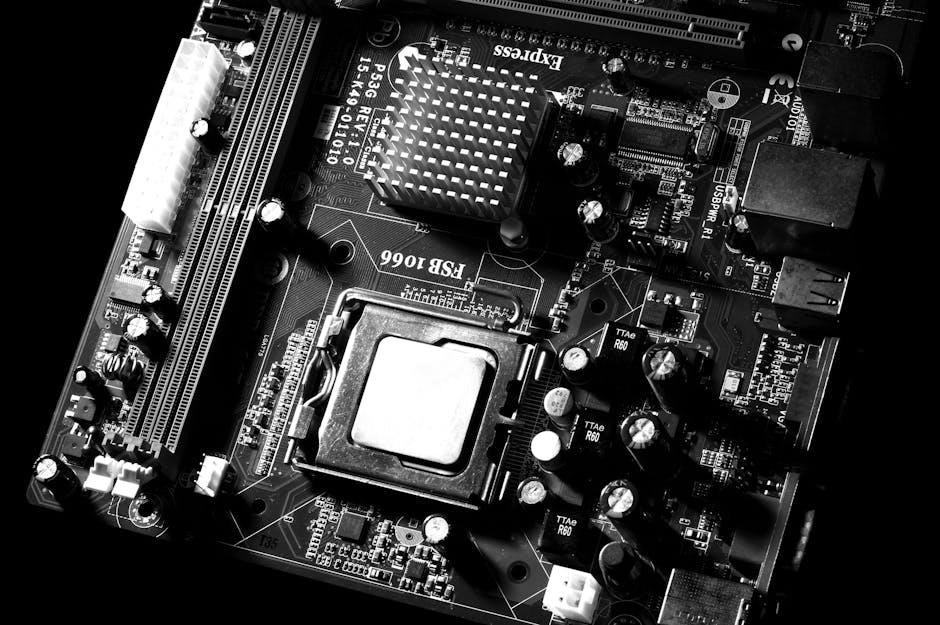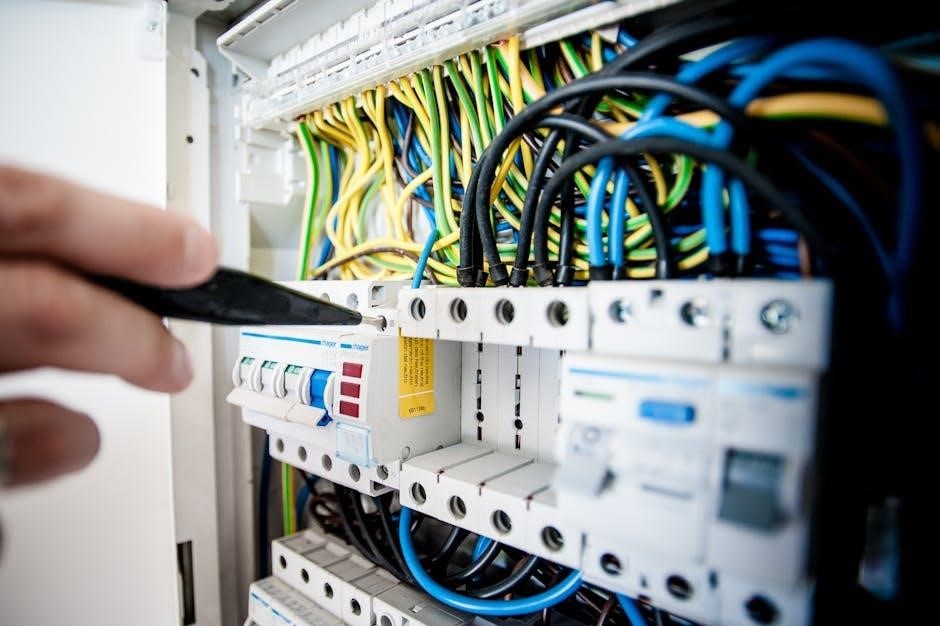Heliana’s Guide to Monster Hunting PDF is a comprehensive resource for D&D 5e, offering detailed mechanics for tracking, crafting, and battling monsters, with customizable content for unique campaigns.
1.1 Overview of the Guide
Heliana’s Guide to Monster Hunting PDF is a third-party D&D 5e expansion that enhances gameplay with detailed monster hunting mechanics, crafting systems, and new classes. It introduces tracking, harvesting, and combat strategies, offering players and DMs a fresh way to engage with monsters. The guide includes a Monster Tamer class, customizable rules, and a Digital Asset Bundle for enhanced play. Its popularity stems from its versatile, campaign-agnostic design, allowing seamless integration into any adventure, making it a must-have for immersive monster-hunting experiences.
1.2 Importance of the Guide in D&D 5e
Heliana’s Guide to Monster Hunting PDF stands out as a vital resource for D&D 5e, offering unique mechanics that enhance monster interactions. It provides detailed tracking, crafting, and combat systems, enriching gameplay depth. The guide’s customizable nature allows DMs to tailor content to their campaigns, fostering creativity and immersion. Its popularity grows as players and DMs seek fresh, engaging ways to integrate monster hunting into their adventures, making it an indispensable tool for elevating D&D experiences.
Key Features of Heliana’s Guide to Monster Hunting PDF
Heliana’s Guide includes monster hunts, tracking mechanics, crafting rules, and new classes like the Monster Tamer. It also offers a Digital Asset Bundle for enhanced play experiences.
2;1 Monster Hunts and Tracking Mechanics
Heliana’s Guide introduces detailed monster hunts with tracking mechanics, allowing players to pursue creatures actively. Each hunt includes clues, DC checks, and dynamic encounters, enhancing immersion in D&D 5e campaigns. The guide provides structured scenarios, from identifying tracks to final confrontations, making monster hunting a core gameplay feature. Players can engage in realistic predator-prey dynamics, with optional crafting and harvesting rules adding depth. This system offers DMs flexible tools to create compelling narratives and challenges, integrating seamlessly into existing campaigns for a unique experience.
2.2 Crafting and Harvesting Rules
Heliana’s Guide features a robust crafting system, allowing players to harvest materials from defeated monsters. These resources can be used to craft gear, tools, or items, enhancing gameplay depth. The guide details specific harvesting mechanics, such as required tools and skill checks, ensuring immersion. Crafting is optional, letting DMs tailor the system to their campaigns. This adds a new layer of strategy and reward, making monster hunting more engaging and integrated into character progression and world-building efforts.
2.3 New Classes and Subclasses (e.g., Monster Tamer)
Heliana’s Guide introduces the Monster Tamer, a unique class that enables players to capture, train, and command creatures. This class offers a fresh take on monster interactions, blending combat and strategy. Subclasses expand this concept, providing diverse playstyles. While the Monster Tamer isn’t currently in the Digital Asset Bundle (DAB), it highlights the guide’s innovative approach to character creation. These additions enrich the game with new dynamics, appealing to players seeking non-traditional roles and immersive storytelling opportunities in their campaigns.
2.4 Digital Asset Bundle (DAB) and Supplementary Content
The Digital Asset Bundle (DAB) for Heliana’s Guide enhances your monster-hunting experience with standalone files, including maps, tokens, and trackers. Supplementary content features Bard Recordings with 10 unique ballads, Monster Soundscapes with 25 tracks, and Additional Random Encounters for dynamic gameplay. The Digital LArsènes Crafting Catalogue provides player-facing resources, while the DAB ensures seamless integration into virtual tabletops like Foundry VTT. These assets offer unparalleled depth, making your adventures richer and more immersive.

Pricing and Availability of Heliana’s Guide to Monster Hunting PDF
The PDF costs $34.95, with a Digital Asset Bundle (DAB) at $39.95 and a combined PDF+DAB bundle at $59.95. Physical copies are available, though sourcing them can be challenging.
3.1 Digital Versions (PDF, DAB, Foundry VTT)
The digital versions of Heliana’s Guide to Monster Hunting include a PDF priced at $34.95, a Digital Asset Bundle (DAB) at $39.95, and a Foundry VTT version at $69.95. The DAB offers standalone files to enhance your monster hunting adventures, while the PDF provides a detailed, setting-agnostic guide. Supplementary content like bard recordings and monster soundscapes adds depth to your gameplay experience, making these digital versions versatile tools for any D&D campaign.
3.2 Physical Copies and Manufacturing Updates
Physical copies of Heliana’s Guide to Monster Hunting are currently in production, with manufacturing updates shared regularly. Version 1.12 of the PDF, exported for print, is now available on BackerKit. While physical copies are highly anticipated, some users have reported difficulty locating them for purchase. The guide’s popularity and detailed content make it a sought-after resource for D&D enthusiasts, with ongoing updates ensuring the best quality for players and DMs alike.

Community Feedback and Beta Testing
Community feedback and beta testing have shaped Heliana’s Guide to Monster Hunting, with players and DMs praising its innovative mechanics and engaging monster hunts, fostering a dedicated community.
4.1 Player and DM Experiences with the Guide
Players and DMs have praised Heliana’s Guide to Monster Hunting for its engaging mechanics, with many finding the monster hunts and crafting rules to be highlights of their campaigns. The flexibility of the guide allows for seamless integration into existing stories, making it a versatile tool for both new and experienced players. DMs appreciate the customizable content, while players enjoy the immersive experience of tracking and battling monsters, enhancing their overall D&D 5e gameplay.
4.2 Feedback Mechanisms and Future Updates
The creators of Heliana’s Guide to Monster Hunting actively engage with the community through platforms like the Loot Tavern Discord, where players and DMs can submit feedback. Beta testing has concluded, but the team continues to gather input for balance adjustments and new features. Regular updates and errata are released based on user suggestions, ensuring the guide evolves to meet community needs. This iterative approach highlights the developers’ commitment to refining and expanding the content in future editions.
Supplementary Content and Resources
Heliana’s Guide includes Bard Recordings with 10 unique ballads, Monster Soundscapes for immersive audio, and Additional Random Encounters with roll-tables to enhance your monster-hunting adventures.
5.1 Bard Recordings and Monster Soundscapes
Bard Recordings offer 10 unique ballads that serve as both in-game clues and inspirational tracks, while Monster Soundscapes provide 25 immersive audio tracks, including monster initiative sounds and death noises. These resources enhance the atmosphere of your campaign, allowing players and DMs to fully engage with the game world. The soundscapes are designed to complement the monster hunts, creating a more dynamic and immersive experience. These supplementary assets are perfect for setting the mood during pivotal moments in your adventures.
5.2 Additional Random Encounters and Roll-Tables
Additional Random Encounters expand the guide’s tracking chapter with 44 new roll-tables, offering diverse and unpredictable scenarios. These encounters enhance the dynamic nature of monster hunting, providing DMs with tools to create unique and engaging experiences. The roll-tables are designed to integrate seamlessly with the guide’s mechanics, ensuring a fresh and exciting adventure each time. They add depth and variety, allowing for spontaneous storytelling and increased replayability in your monster hunting campaigns.
Rule Zero and Customization in Heliana’s Guide
Heliana’s Guide encourages customization, allowing DMs to adapt content to their campaigns. It empowers flexibility, ensuring every element can be tailored to create unique and engaging storytelling experiences.
6.1 Flexibility in Using the Guide’s Content
Heliana’s Guide is designed to be adaptable, offering DMs the freedom to modify or discard content as needed. Players can adjust DCs, names, or quest hooks to fit their campaigns. The guide encourages creativity, allowing for seamless integration of its mechanics and stories into any setting. Whether tweaking monster stats or reimagining hunt scenarios, the flexibility ensures a unique experience tailored to each group’s preferences and playstyle.
6.2 Tips for Adapting the Guide to Your Campaign
Heliana’s Guide emphasizes Rule Zero, encouraging DMs to tailor content to their campaigns. Adjust DCs, rename locations, or tweak quest hooks to align with your story. Balance encounters by modifying monster stats or adjusting crafting requirements. Incorporate player preferences by integrating their ideas into hunts or crafting systems. Use the guide’s flexibility to create a personalized experience, ensuring every element serves your narrative and enhances player engagement.

Heliana’s Guide to Monster Hunting in the D&D Community
Heliana’s Guide has become a standout resource in the D&D community, praised for its innovative mechanics and versatility. Its success as a crowdfunded project highlights its popularity, with over 14,000 backers embracing its unique approach to monster hunting and crafting. Players and DMs alike appreciate its setting-agnostic design, making it a top choice for enhancing campaigns with dynamic encounters and customization.
7.1 Reception and Popularity Among Players
Heliana’s Guide to Monster Hunting has garnered significant enthusiasm among players and DMs alike. Its crowdfunding success, with over 14,000 backers, underscores its popularity. Players praise the guide’s innovative mechanics, such as monster tracking and crafting systems, which add depth to campaigns. The customizable content and setting-agnostic design make it versatile, fitting seamlessly into various playstyles. Enthusiasm for its unique approach to monster hunting has solidified its place as a go-to resource for enhancing D&D 5e experiences.
7.2 Comparisons with Other D&D Supplements
Heliana’s Guide to Monster Hunting stands out among D&D supplements for its unique focus on monster tracking, crafting, and hunting mechanics; Unlike official WotC content, it offers a fresh, third-party perspective, appealing to players seeking new challenges. Its customizable nature and setting-agnostic design make it versatile, similar to popular expansions like Out of the Abyss but with a distinct flavor. Fans praise its innovative approach, making it a standout addition to the D&D 5e ecosystem.

The Future of Heliana’s Guide to Monster Hunting
Heliana’s Guide to Monster Hunting is expected to expand with Part 2, introducing new classes, mechanics, and content. The community eagerly awaits updates and improvements.
8.1 Upcoming Expansions and Part 2 Rumors
Heliana’s Guide to Monster Hunting is rumored to expand with a highly anticipated Part 2, introducing new classes, mechanics, and content. The Monster Tamer class, though not yet available, is a topic of excitement. Developers are considering community feedback to refine and expand the guide, ensuring it meets player demands. While no official release date has been confirmed, enthusiasts speculate about new features and improvements. The future of this beloved supplement looks promising, with updates expected to enhance its already robust offerings.
8.2 Potential New Features and Classes
Heliana’s Guide to Monster Hunting may expand with new classes like the Monster Tamer, offering unique abilities for creature companionship. Rumors suggest enhanced crafting and harvesting systems, alongside expanded monster soundscapes. Additional subclasses and mechanics for tracking and combat are also anticipated. The guide’s future updates aim to incorporate community feedback, ensuring a richer, more dynamic experience for players and DMs alike. These potential additions promise to deepen immersion and flexibility in D&D campaigns.
How to Use Heliana’s Guide in Your Campaign
Integrate monster hunts into your narrative and balance mechanics to suit your players, ensuring a seamless and engaging experience tailored to your campaign’s needs;
9.1 Integrating Monster Hunts into Your Story
Seamlessly weave monster hunts into your campaign narrative by introducing them as side quests or central plot points. Use the guide’s tracking and crafting mechanics to create immersive experiences, ensuring hunts feel rewarding and impactful. Tailor encounters to your party’s strengths and the story’s tone, balancing difficulty and narrative flow. Incorporate unique rewards and lore to make each hunt memorable, enhancing the overall adventure and player engagement.
9.2 Balancing the Guide’s Mechanics for Your Players
Balance the guide’s mechanics by adjusting difficulty based on your party’s strength and experience. Use Rule Zero to customize encounters, tweaking DCs and rewards to suit your campaign. Consider optional rules like crafting and harvesting to enhance gameplay without overwhelming players. Ensure monster hunts and tracking mechanics align with your story’s tone and pacing, providing challenges that are rewarding yet fair for your unique group of adventurers.
Heliana’s Guide to Monster Hunting PDF offers a comprehensive, setting-agnostic resource for D&D 5e, providing versatile mechanics and rich content that enhance any campaign with customization and balance.
10.1 Final Thoughts on Heliana’s Guide to Monster Hunting PDF
Heliana’s Guide to Monster Hunting PDF is a versatile and engaging resource for D&D 5e enthusiasts, offering detailed mechanics for monster hunting, crafting, and tracking. Its customizable content, including new classes like the Monster Tamer, enhances campaign flexibility. With positive community feedback and ongoing support, this guide is a valuable addition to any DM or player’s toolkit, providing endless opportunities for creative and immersive adventures. A must-explore for those seeking fresh challenges and unique storytelling possibilities.
10.2 Encouragement to Explore the Guide
Dive into Heliana’s Guide to Monster Hunting PDF and unlock a world of immersive monster-hunting experiences. With its rich mechanics and customizable options, this guide empowers you to craft unique campaigns. Whether you’re a seasoned DM or a curious player, its detailed tracking systems and crafting rules offer endless creativity. Don’t miss this opportunity to elevate your D&D 5e adventures and discover the thrill of monster hunting like never before.
























































